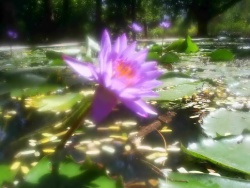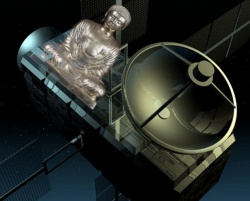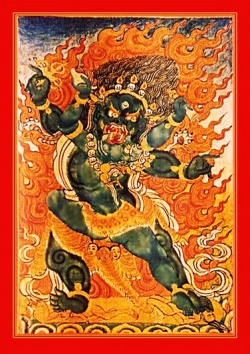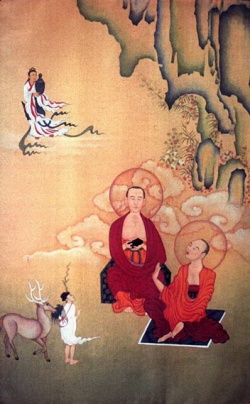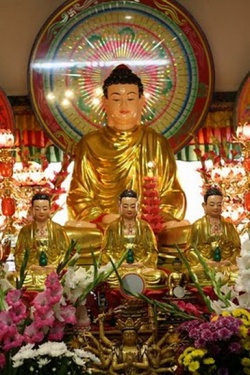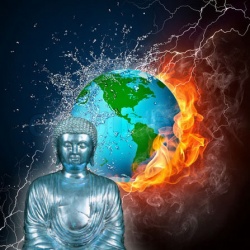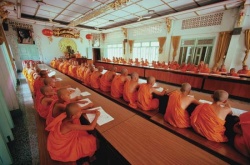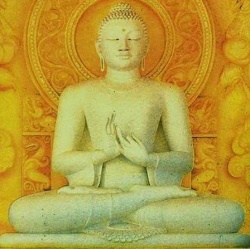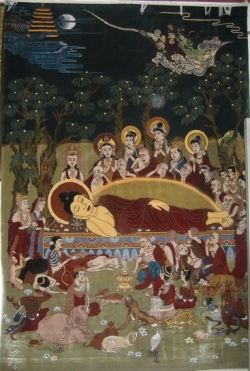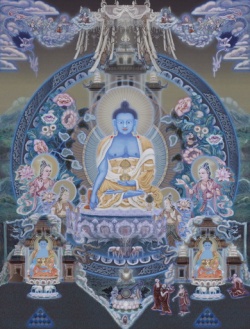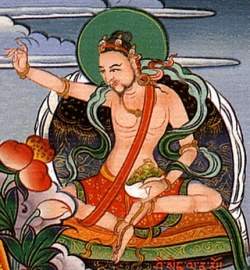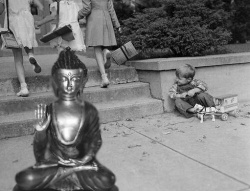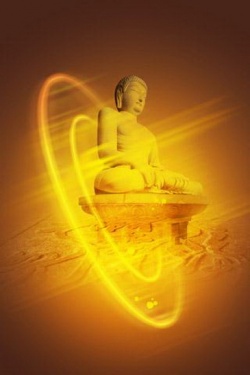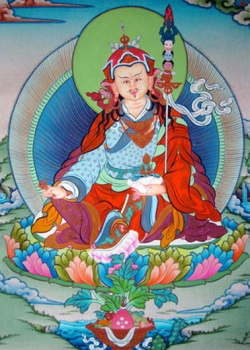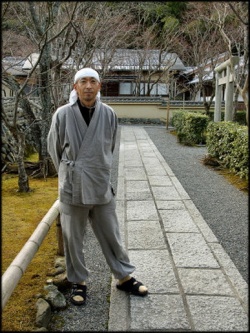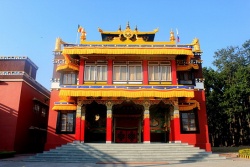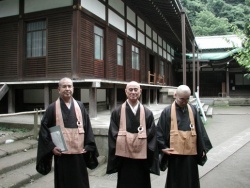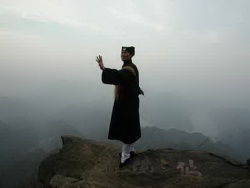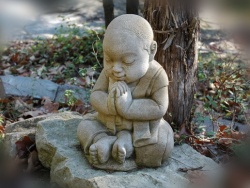A Buddhist Critique to the Classical Chinese Tradition By Jan Yun-Hua
A Buddhist Critique to the Classical Chinese Tradition
By Jan Yun-Hua
Journal of Chinese Philosophy
V. 7 (1980)
pp. 301-318
Copyright 1980 by D. Reidel Publishing Co.
I
The spread of Buddhism to China was a great event both for the Chinese and for Buddhism itself: for the Chinese there were many elements of Indian culture that her classical tradition was lacking; for Buddhism, the acceptance of the religion by a highly cultured and great country such as China, ultimately gave new development to Buddhism. The process of confrontation and mutual absorption between the classical tradition of China[1] and Buddhism had passed through different stages and involved many thinkers in Chinese history. Broadly speaking, the process can be divided into two periods, the earlier and the later. The earlier period began with the spread of Buddhism into the land. Those who took offense at the confrontation were scholars of the classical traditions. They questioned and attacked Buddhism from various viewpoints with ethics as the principal. The Buddhists were on the defensive but wisely noted some value in the Chinese tradition and silently absorbed many elements from it, reshaped the religion with new modifications and accentuations, and, consequently created different schools of the religion. As a whole, the Buddhists were successful during the period as they not only maintained, but even increased their influences on China, thus causing the native tradition of the land to become inactive for a period of a few hundred years. The later period began with the completion of the formation of Chinese Buddhism, in which some Buddhist thinkers criticized Confucianism and Taoism in order to define and further consolidate their positions. Their criticism of the classical tradition was gentle and intellectual, but right on the target. It was through this challenge and criticism that scholars of the Confucian tradition took up the new task, new topics, seized the situation in their hands and contributed to the new interpretation of their philosophy, which is known as Neo-Confucianism. Consequently, the Confucian doctrine revived with new dynamism, while Buddhism lost its dominant influence over Chinese intellectuals, although it retained its its influence on the Chinese mass.
There are a number of researches on the early confrontations between Buddhism and the classical tradition, and our knowledge of Neo-Confucian criticism of Buddhism has been enriched by recent publications.[2] Compared with this, the Buddhist critique of the classical traditions of China during the T'ang period is almost untouched.[3] Among the Buddhist critics, Tsung-mi (780-841 A.D.) was the most systematic.[4] Unlike some of his colleagues, Tsung-mi studied Chinese classics for a number of years, and his knowledge of them was quite broad and scholarly. It was only after he had known Chinese classics more thoroughly and more deeply that he began to realize that the study could not put his mind at peace, because it failed to answer the question that constantly disturbed him. In an autobiographical passage, he described the circumstances as[a] "Though from the childhood to my youth, the [studies] of Confucian Classics were my works, yet I often felt that I have no place to return to."[5] After he studied a little Buddhism, he discovered that[b] "there seems something that is worthy of trust."[6] It was only after years of irresolution and pondering that he finally had a feeling of[c] "knowing clearly that the relation between cause and effect (karma) is like the relations between form and shadow, or echo and sound." And consequently,[d] "Once one knows that worldly affairs and skill are irrelevant to one's deeds,"[7] he renounced the household life and became a monk. This was the background of Tsung-mi's understanding and criticism of the classical tradition of China.
The purpose of this paper is to examine Tsung-mi's critique of the classical tradition: the topic, standpoint, and the limit of his criticism. The materials used in the paper are largely based on his larger commentary and the sub-commentary on the Sutra of` Complete Enlightenment.[8] It was in these two books, that Tsung-mi fully examined and criticized the key Chinese conceptions as defined and taught in the Classics, viz., Tao, the Mandate of Heaven (t'ien-ming), the Spontaneity or Self-so (tzu-jan) and the Primal Force or pneuma (yuan-ch'i). Though these questions and criticisms have been re-examined and summarised by him in his later works, his position is more fully expounded in the commentaries.
II
A.Tao
According to the classical tradition of China, man and animal as well as all things in the world, are produced and nourished by the great Tao. Lao Tzu says:
Tao produced the One,
The One produced the two.
The two produced the three.
And the three produced the ten thousand things.[9]
The One referred to here, meant the undifferentiated force or pneuma, which is the manifestation of Tao. This pneuma is the root, it is described by Chuang-tzu in the following terms: "It establishes root and branch but knows no root and branch itself; it determines when to store up or scatter but knows no storing or scattering itself."[10] And the Book of Changes states: "In the I there is the Great Ultimate (t'ai-chi), which produced the two Forms (i)."[11] This is the meaning of "The One produced the two." And the production of the rest by Heaven and Earth refers to the last two sentences of the quoted verse. From this it is clear that both the wise and fool, noble and base, poor and rich, joy and sorrow are all produced and conditioned by the great Tao. They will return to nothingness when they die.
However, the great Tao itself is empty and nothing. It is neither a being nor a thing. It is "eluding and vague," hence it cannot be determined by perception and audition. This is why Lao Tzu has said "And being comes from non-being."[12] And "Eluding and vague, in it are things."[13] From these statements, one knows that these thinkers considered that there is a huge, strange, and constantly changing entity, which is empty yet able to cover the Heaven and to carry the Earth, move stars and fly birds. Hence Chuang Tzu states that "emptiness . . . inactive is the root of the ten thousand things."[l4] And Lieh Tzu states "all that has shape was born from the Shapeless."[15] In other words, the entity is the source of life and death, the root of wise and ignorant, the origin of fortune and misfortune, and the store of calamity and disorder.
From the Buddhist viewpoint, if the Tao is the source and root, or the origin and the store of all phenomena, and the Tao is eternal, then calamities and disorders, death and ignorance would last forever and cannot be eliminated. Why? Because all of these are rooted in Tao and the latter is eternal. Should this be the case, what is the need of the teachings of Lao and Chuang? If the Tao breeds tigers and wolves, cherishes the wicked kings Chieh and Chou, takes away lives of virtuous Confucian disciples Yen and Jan prematurely, and sent down calamity to worthy brothers I and Ch'i; then the Tao assists evils and abandons the good. If this is the case, how could it be described as the 'esteemed'?[16] Why should man have to "model himself... after Tao?"[17]
B.The Mandate of Heaven
According to Chuang Tzu, "Heaven and earth are the father and mother of the ten thousand things. United they become a body; parted they return to [the undifferentiated state of] beginning."[18] He also says that those who possess extraordinary ability received their life from heaven.[19] Lieh Tzu says that "the spirit is the possession of heaven, the bones are the possession of earth."[20] And in the Analects, one finds the statement, "Life and death are the Mandate of Heaven; wealth and honor depend on Heaven."[21]
If one accepts the doctrine of the Mandate of Heaven as it has been described, the Buddhist critic will raise a number of questions on the doctrine. For example, if wealth and honor are dependent on Heaven, why then has Heaven made more people poor and a few people rich? more base and fewer noble? And what is the reason for Heaven's different treatment of men? Does this show that Heaven is inequitable? The Book of Changes states "Rejoice in Heaven and understand destiny, therefore there is no worry."[22] If that is the case, why then do misbehaved ones become nobles and well-behaved remain humble? virtuous poor and unvirtuous rich? humane ones die prematurely and inhumane ones live long? righteous unlucky and unrighteous lucky? those who were with Tao decline and those who went against Tao prosperous? Does this show that Heaven is unjust?
In the Book of Documents, it has been stated that "the Way of Heaven is to bless the good and to punish the bad."[23] And the Book of Changes says, "It is the way of heaven to send down its beneficial influences below, where they are brilliantly displayed. It is the way of earth, lying low, to send its influence upwards and (there) to act. It is the way of heaven to diminish the full and augment the humble. It is the way of earth to overthrow the full and replenish the humble ...."[24] Even if this is taken for granted, one still finds that though the ten thousand things are produced by Heaven, yet animals and birds kill and eat each other. Does this mean that Heaven is the most inhumane and unrighteous? Where is the blessing to the good and where is the punishment to the bad? If the beneficial and punitive influences are not shown, then is Heaven irresponsible? Although it is said that "The great characteristic of Heaven and Earth is to produce,"[25] yet if producing is regarded as virtuous, then death will mean injury. If this is the case, why should everyone die regardless of whether they are virtuous or unvirtuous? If "What Heaven imparts to man is called human nature,"[26] does not the cruel nature of the tiger and leopard also come from the Mandate? If so, then their cruel behaviour cannot be regarded as inhumane. Consequently, the deeds of unfilial, disorder, inhumane and unrighteous are all imparted to man by Heaven, and the moral teaching of the sage indicates that he is against heaven. However, the Book of Documents has praised the kingly way;[27] and the Book of Odes has criticized the disorderly politics.[28] The rites have been regarded as superior for governing the people and the music as superior for transforming evil customs. If peace and violence, ignorance and wisdom, cruelty and benevolence are all determined by Heaven, then man can do nothing about it. In that case, rite and music are irrelevant to the government and customs; and why should the sage praise these virtues? If, on the other hand, good and evil are dependent on man, then every man will be able to take care of himself. Why is it necessary to urge on the authority of Heaven?
C.Spontaneity (Tzu-jan)[29]
Those who propound the doctrine of Spontaneity claim that birth and death, rise and decline, are all from empty non-being, and are completed by inactivity. They came out from the non-being which "is The Vague and Elusive."[30] As they were produced by the One which is not produced by the other, so it is "eluding and vague."[31] It comes without a trace and goes without end. It has not entrance nor residence, and it penetrates into all directions at its leisure. Because of it, the Heaven cannot but stay on high, the earth cannot but lie in expansion, the sun and moon cannot but shine brightly, and the ten thousand things cannot but live prosperously. This is the Tao. Henceforth, Tao is without origin, enters into things without entrance, self-produced without parents (root) and self-perished without cause. Without parent and without cause, one that has been called the empty non-being. It is self-produced without action and self-manifested without effort. Henceforth, it is said that "the two inactions combine and all things are transformed and brought to birth."[32] Nevertheless, inaction is the secret spring of Heaven's works. The empty non-being is the entrance of Heaven. As the entrance of Heaven is non-being, it cannot be sought from being; as the secret spring of Heaven is inactive, it cannot be sought from action. Because of inaction there is nothing remaining undone, and because of non-being there remains no being outside it. Therefore, it carries and transforms all things, not leaving anyone outside, composed and decomposed all things without exhaustion, covers heaven and carries earth without tiredness and creates forms without skill. From this, one infers that the Spontaneity works without action. Self-transformation does not depend on cause and conditions (hetupratyaya). All things come from empty non-being and are produced through inaction. Things that are completed through inaction, means the production without the use of instruments: things that are produced from empty non-being, means that production is independent of other things. Therefore, these things are self-produced, self-transformed and self-contained. Through self-completion and self-development a thing has been brought to its fullness. Hence it is said: "Relies upon it and does not know he is doing so. This is called the Way."[33]
The virtuous and the ignorant are different, and they should not and cannot be changed, for any change would harm their respective destinies. Sage Yao and wicked Chieh are different in nature and this should not be criticized because any criticism would reduce their qualities of simplicity. From this. one infers that the Heavenly Reason or Spontaneity does not depend on cultivation and learning because cultivation and learning are human activities but not the actions of Heaven or Spontaneity. Humanity and righteousness, sagehood and wisdom are artificial and destructive to true nature. If the true nature is destroyed by humanity, then humanity is unnecessary; if the Heaven is harmed by regulation, then the regulation is unnecessary. Thus, let each man follow his own nature, and let each nature follow its own Spontaneity and let them depend neither on humanity nor righteousness. Therefore, those who trust the Heavenly Spontaneity do not depend on cultivation; those who follow reason do not seek after anything. Henceforth, it is said that "The pursuit of Tao is to decrease day after day,"[34] and that "Abandon learning and there will be no sorrow."[35] This means that the Heaven functions and the Earth stays but not for themselves. If any one follows what his mind has conceived and cultivated thereafter, whatever he might attain will certainly not be Spontaneity. Hence it is said: "Abandon sageliness and discard wisdom."[36]
The Buddhist criticism of the theory of Spontaneity is mainly from a causal viewpoint. It consists in pointing out that if the world is self-produced and self-transformed without cause and conditions, then it is likely to claim that the sprout and the stalk of rice are produced without the cause of seed and conditions of water, soil and labour. If this is the case, then all plants, men, animal, insects, etc., would produce everywhere and at all times. However, as one sees that this is not the case, it is obvious that the doctrine of Spontaneity becomes unsustainable. Furthermore, if the production of Spontaneity is independent from cause and conditions, then stone would produce grass, grass would produce man; however, the animal is irrelevant to productive cause of man, nor man to stone. From this, one understands that the productive causes cannot even be interchangeable among species, and the claim of production without cause and conditions becomes more absurd. Similarly, if the production is free from conditions, then there will be no distinction of priority and posteriority in generation. Therefore, the harvest of crops should take place at any time why should it wait until the fall?
From all of these, one understands that self-differentiation without cause and conditions is neither significant nor reasonable. Hence the transformation is illogical. Without logic or reason, no enquiry of good and bad can be made and no solution can be found. Because everything depends on the transformation of Spontaneity, Spontaneity is the root of both good and evil. The sage values the root, so he taught it. However, if this is the case, then both good and evil are spontaneous. Why, then, did the sage promote the good and criticize evil? Why did he respect the virtuous and look down on fools?
D.Pneuma or Primal Force [37]
Pneuma is what Chuang Tzu has described in the statement that "Man's life is a coming-together of breath. If it comes together, there is life; if it scatters, there is death."[38] Chuang Tzu also says "In the midst of the jumble of wonder and mystery a change took place and she had a spirit. Another change and she had a body. Another change and she was born."[39] "The ten thousand things are really one ... So it is said, you have only to comprehend the one breath that is the world. The sage never ceases to value oneness."[40] The Book of Change states "[the integration of] vital forces becomes things, scattering of the heavenly soul becomes the change."[41] This means the ten thousand things are nothing but pneuma, apart from pneuma there is nothing. Things in the world receive their spirit from the Heaven and forms from the Earth. Therefore spirit and form are nothing else but pure or impure materials for pneuma. When integrated, they become things; when disintegrated, they return to their original state of undifferentiation. Though integration and disintegration are different, yet they are all pneumas. It is from this eternal pneuma, the function of transformation is accomplished. Though there are thousands of changes and transformations, they have neither a beginning nor an end. While discussing death, the Li Chi states that death is when "the soul pneuma (hun) returns to heaven and the body and animal spirit (p'o) returns to earth."[42] Therefore, the sacrifice has to be sought from yin and yang. The return to heaven and earth is the return to yin and yang. When yin and yang are integrated together, they become a man again.
The Buddhist criticism is that if man, etc., are suddenly born from pneumas without spirit, worldly experience or thinking, how could a child be able to express its like or dislike, affection and passion? If one claims that after a child has been suddenly born, he will be able to express his feelings at once without dependence on cause and conditions, then he will be able to behave like a mature man. Why should the child have to wait for years to do so? If one says that when the child was born, the pneuma he received was originally peaceful; it was under the worldly influence that the pneuma changed. However, the theory of the after birth influences itself has already made the doctrine conditional and that is what it has originally refused to accept. Moreover, the falcons and dogs are able to hunt by their nature. Man trains them according to their nature. If they had no such nature, and became so only because of present conditions, then why is man unable to train pigeons and goats to hunt? If one suddenly becomes existent by endowment of pneuma, and suddenly becomes nonexistent when pneuma scatters, then from where do the ghosts and spirits come. How could their spiritual power of knowing remain unbroken? In the world, there are cases in which someone is able to remember past events, or to recall a previous life as clearly as reflections in a mirror. From these, one knows that the present life is a continuation of the past, but not something which came into existence because pneuma has suddenly integrated together. Moreover, from verifiability of ghosts and spirits, one knows that their power of knowing is unceasing and continues after death. Hence the claim of man becoming nonexistent when pneuma scatters, becomes absurd. This is the reason why sacrifice and religious prayers are offered. Furthermore, there were people who narrated their experiences after death, when they were revived; or that they had influenced their relatives after their death by letting their relatives know what they need in the other world.
Looking at the problem from a logical point of view, one would find that pneuma of Heaven and Earth, originally has knowledge. Yet how can this ignorant pneuma suddenly become capable of knowing once it is in a man? If one claims that ignorant pneuma is capable of knowing, then grass and woods should be able to know, as they are endowed with the same pneuma. From this, one sees that though men, animals and the ten thousands came into existence by adhering to pneuma, yet the master is the beginningless consciousness of Mind (hsin-shen) that transmits the influence from life to life continuously. As birth and death, becoming and disbecoming are continued through mental transmission, good and evil are caused by the influence from the past and, consequently, the benevolence or wickedness, good or evil are dependent upon men, but not the Heavenly pneuma. Only when one agrees with this principle, then one has a religion to follow and a path to cultivate, and is able to verify the beginning of calamity or fortune, the reward of good and the punishment of evil, and to know how to avoid disaster and how to search for luck.
III
From the criticism mentioned above, it is clear how Buddhism differs from the classical philosophy of China. The central difference has been explicitly described by the critic himself:[e] "The Confucianist honours the Five Constant Virtues, the Taoist honours Spontaneity; and the Buddhist honours Cause and Conditions."[43] Henceforth, the Buddhist criticism on the classical tradition of China has been precisely from a causal viewpoint. In other words, the Buddhist felt that the main difficulty of the classical Chinese philosophy either suffered from a perverse view or lack of causation.[44]
For example, in the Tao Te Ching, one finds two statements: one claims "Tao is eternal"; the other claims that "Tao produced the One",[45] However, any dharma (element) that is capable of producing, will certainly not be eternal. The four great elements of Earth, Water, Fire and Wind (Mahaabhuuta) are capable of production, yet they themselves are impermanent. If the Tao of great Nature has "produced the One", then Tao itself will not be eternal because it is capable of production. Any production is something new and different from the one from which the production has come. Otherwise effect will not be manifested, and hence nothing is new.
The next notion in Taoism is that Tao has been considered as universal. Chuang Tzu states that "there's no place where it (Tao) doesn't exist"; "It is in the panic grass ... . It is in the piss and shit!"[46] This claim cannot be sustained because if the Tao is impermanent, how can it be universal? If Tao exists in phenomenon, then it is impermanent because the latter is different from universal Nothingness. From this, one may say that Tao is not universal. If Tao is neither eternal nor universal, it is obvious that the Tao cannot be considered as the real.
To look at the problem from a causal viewpoint, the claim of Tao as absolute and yet having its relation with phenomena becomes more difficult. If Tao is single and the cause of phenomena, how can a single cause produce a multiple effect? Can a millet seed produce all kinds of grains like corn, wheat, pea, melons and vegetables? Or a peach tree grow plums, pine seeds, crab-apples, pears or dates? Even if the single cause and its multiple effects is granted as possible, the conclusion will still be defective. First, if the Tao of Nature is eternal and productive, then all things including people, animal, grass and trees should be produced simultaneously and constantly so. Why? Because Tao is eternal and is the cause for these productions. However, the truth is that there are times when productions take place, and other times when productions do not take place. Secondly, if the Tao is universal and is the cause of production, then all things should be produced anywhere and everywhere because they are effects of the same cause. In that case, there will be no explanation why certain things are not produced in some places. Under these circumstances, the claim of Tao as eternal, universal and productive is no longer sustainable; If one claims that Tao is the single cause, then one fails to explain the aforementioned difficulties; if one accepts that the production of certain things are dependent on time and conditions, then the very acceptance itself is contradictory with the Taoist claim, viz., only Tao alone is the sole cause. Thirdly, the acceptance of time and conditions will lead to a further complication, namely from where are these conditions produced? If they come from the great Tao, these conditions would lead to simultaneous production of all things in all places as the principal cause (Tao) is eternal and universal. But that cannot be the case as the claim that Tao is eternal and universal has already been disproved. It is clear that from this, one will be able to point out that Taoism lacks a correct understanding of cause, and henceforth, it is unable to correctly defend its own position. If the understanding of causation is perverse, then to have a correct goal or religious cultivation becomes impossible.
The lack of causation in Taoism refers to the claim that Tao produced others naturally and the process of the production does not depend on cause nor conditions. This is, therefore, called Natural production or uncaused birth. If that is the case, things would be produced anywhere and everywhere, anytime and all the time, because their becoming absolutely does not depend on anything else. Moreover, the acceptance of a Natural process without cause and conditions is even more dangerous from the viewpoint of religion. It is so because if the becoming is uncaused, the future of man becomes uncertain, religious goals will not be attainable, hence religious practice and cultivation become meaningless. In other words, the whole of the religious institution is in jeopardy.
After the criticism of the classical tradition of China, Tsung-mi finally declared that what he was criticizing in the tradition was the clinging to the view and the understanding, but not the teachings nor practices. The teachings of loyalty and filial piety are the best Way to govern the country and to treat one's own parents; and the practice of humanity and yielding (jen jang) is the way by which people are able to avoid disasters. His criticism was designed[f] "to remove their defective viewpoints, but not their law."[47]
In the evaluation of the practical value of the tradition, the Buddhist critic finds that[g] "The Confucian cultivation is helpful to (Buddhist) moral discipline; the Taoist practices assist meditation."[48] However, beyond this point, if people still wish to go further, to have a higher understanding and to experience truth, a criticism of the classical tradition becomes necessary. The purpose of criticism is "only for a higher understanding of wisdom (praj~naa) and an experiential entry into Buddha-Truth." It is for these two reasons that the classical tradition became[h] "unprofitable and tiresome..."[49] Because of their value as well as their defects, the Buddhist has criticized the two philosophies of the Chinese tradition on the one hand, and upheld some of their values on the other. He criticized the lack of a correct causal view in the understanding of Tao and its relation to phenomena: he upheld the practices - the diligence and the Five Constant Virtues.
On diligence, the Tao Te Ching stated:
When the highest type of men hear Tao,
They diligently practice it.
When the average type of men hear Tao,
They half believe in it.
When the lowest type of men hear Tao,
They laugh heartily at it.
If they did not laugh at it, it would not be Tao,[50]
The Buddhist conceded that the diligent practice of Tao, as described here, is good and worthy of upholding. Similarly, the Five Constant Virtues of humanity (jen), righteousness (i), propriety (li), wisdom (chih) and trustfulness (hsin), as explained by Confucian scholars, make a true gentleman: "In moments of haste, he acts according to it."[51] These virtues are called constant, because they should be practiced diligently. The Five virtues broadly agree with the Five Moral Rules of Buddhism (pannca-siila). The humanity means to love things, to bestow benefits extensively and to help those who are suffering. In this sense, it is the Buddhist rule of abstaining from killing any living being. In Confucian doctrine, Righteousness means that though determined, but with the norm, one will not act without a reason. Henceforth, "When you find wealth within your reach, do not (try to) get it by improper means; when you meet with calamity, do not (try to) escape it by improper means." [52] One should only get it when it is not against righteousness, otherwise, "Wealth and honor obtained through unrighteousness are but floating clouds to me."[53] If one refuses to obtain wealth by unrighteous means, who will steal? Righteousness, therefore, is the Buddhist rule of "do not take things that are not given." Rites or propriety means to distinguish higher and lower positions, to cease derision and jealousy, to divide inner and outer, and to inhibit controversy and confusion Lustfulness is an extreme action against propriety. The propriety, therefore, corresponds to the Buddhist rule of abstaining from unlawful sexual intercourse. Trustfulness means those who are not double-tongued, nor break an agreement to which one is committed. It is similar to the Buddhist rule of not lying. Wisdom means the explanation of knowledge and its object. When one possesses this knowledge, he will not drink wine nor eat flesh. This is similar to the Buddhist rule of abstaining from the use of intoxicants.
However, the rule is not entirely congruous with the knowledge, though the matters concerned in both are somewhat belonging to the same category. It is because drinking will confuse the mind and effect perception and judgement; eating meat and fish will pollute one's stomach and effect the spirit. This is the reason why they are paired together.
Speaking as a whole, the law established by Confucius teaches people to be respectful, careful, modest and obedient. All these are not in contradiction with the moral rules of Buddhism.
IV
Tsung-mi's criticism of the classical philosophy of China from the standpoint of causation is very significant in the history of Buddhism in China and in Chinese philosophy itself. This is also helpful in understanding Tsung-mi himself by pinning down the exact reasons that drove him to Buddhism.
It is well-known that it was with the emergence of Buddhism that "a clear-cut theory of causation in the history of Indian thought" has for the first time appeared.[54] Thereafter the Buddhist constantly held the position and repeatedly stated that, according to their understanding, all phenomena came into existence through cause and conditions. World events are in a flux and they are mutually dependent on each other for co-arising (pratiitya-samutpaada). The Buddhist had to uphold this position because it was only through this philosophy that their Middle Path became meaningful and distinctive. And it is through this philosophy that they became able to reject eternalist doctrines on the one hand, and nihilist on the other. Causation was the central problem in the debates between Buddhist and other schools of Indian philosophy.[55]
The standpoint and dialectical arguments which our author has adopted for criticizing the classical tradition of China recalls Naagaarjuna's refutation of other philosophies of India in his famous Muula-maadhyamika-kaarikaa and some Yogaacaarin Masters' defence of their position. To review Tsung-mi's criticism from this perspective, one would see that in spite of historical and philosophical transformation of the religion in China, the basic standing of Tsung-mi is still from the Buddhist viewpoint of causation. This, to some extent will eliminate some scholars' suspicion that Buddhism outside the Indian sphere of civilization is either impure or not Buddhism at all.
For the history of Chinese philosophy, the criticism presented here is very significant in three respects: first this probably reinforces the view that there was no systematic development of causation in classical Chinese philosophy. The examples given by Hu Shih in his chapter on "Cause, form and deduction" as found in Neo-Mohism was more or less, as the title of his book has rightly indicated, a logical method.[56] The place of causation was never so central nor soteriologically important in ancient Chinese philosophy as it has been in Buddhism. This further explains the inadequacy of textual support in the two recent papers on Causation or Causality in Confucian thought.[57] A careful examination of the Buddhist critique makes this point even more clear.
Second, the introduction of the theory of causation into Chinese thought and the making of it a central problem in philosophical discussion are among the most important contributions of Buddhism to China. This new concept has enriched Chinese philosophy and played a very crucial role in the religious life of the Chinese. Yet when one looks into publications on Chinese philosophy and religion, this new development has not yet been fully taken into consideration by most scholars. With this in mind, the Buddhist critique of classical Chinese tradition perhaps has indicated a new direction of the historical study of Chinese philosophy.
Third, the Buddhist criticism of the classical tradition is, of course, subjective. When one takes religion not merely as academic, but a path to salvation, it is always subjective. Nevertheless, the criticism itself does point out the deficiency of causal consideration in classical Chinese philosophy. This fact of pointing out the deficiency itself is a great service to the study of Chinese philosophy and religion as it helps to crystallize our mind and to focus on the problem. Although the introduction of a new theory does not automatically mean an unanimous acceptance of it, that is the reason why Chinese have remained pluralistic in their religious life throughout the long periods of history. Yet the distinctive outlook, the moral, the natural and the causal, have helped the philosophy of each religion to define their positions and to provide alternatives for the people. The interaction of the three schools in Chinese religion and their philosophical standpoints mutually complete and distinguish each other at the same time. An examination of Buddhist criticism is therefore helpful to understand the philosophy that has been criticized, thus giving us a broader and more comprehensive perspective on the history of Chinese philosophy. Taking Confucianism as an example, the consideration of the Buddhist viewpoint will make our reassessment of Confucianism more complete, as the latter has been in confrontation with other schools of Chinese philosophy, viz., Mohism, Taoism, logicians and legalists in the ancient period; Buddhism in the mediaeval; and the Western thought in our time.[58]
As far as the critic himself is concerned, his dissatisfaction and criticism of Confucian tradition has explicitly explained why he renounced the Confucian way and turned to Buddhism. This, of course, has a wider meaning than merely personal, because there were other monks who had a similar background.
NOTES
1. The classical tradition as understood by Tsung-mi during the T'ang period means Confucianism and Taoism. Other schools of philosophy which once prevailed during the pre-Ch'in times had faded long before the time of our writer.
2. Notably, the translation of Neo-Confucian texts by Professor W. T. Chan and others. Especially Ch'an's paper, 'Wang Yang-ming's criticism of Buddhism', in World Perspective in Philosophy, Religion and Culture: Essays presented to Professor D. M. Datta (Patna, 1969); g. e. Sargent, Tchou Hi contre le bouddhisme (Paris, 1955). For an account of an early confrontation between Buddhism and Chinese tradition, see various studies by P. Pelliot, etc., as listed in Chan's An Outline and an annotated Bibliography of Chinese Philosophy (Rev. ed., 1969), p. 59.
3. There are almost no publications on the controversy from a Buddhist viewpoint during the T'ang period. Lo Hsiang-lin's 'A Study of the Discussion of Confucianism, Taoism and Buddhism in the T'ang Dynasty', Journal of Oriental Studies I (1954) is the only work that I could recall at the writing of this paper.
4. See author's,'Tsung-mi, His Analysis of Ch'an', T'oung Pao 58 (1972). A collection of studies has just published by Shigeo Kamata, Shumitsu kyogaku no shisoshi teki kenkyu (A Historical Study on the Thought of Tsung-mi), Tokyo, 1975.
5. T. No. 1795,p. 576c line 8-9.
6. Ibid,
7. Ibid., lines 15-16.
8. T. No. 482 and it has been translated into English by Charles Luk, in his Chan and Zen Buddhism, Third Series (Berkeley, 1962), pp. 149ff. Tsung-mi's Larger Commentary on the sutra in 12 chapters and its Sub-commentary in 26 chapters are in Hsu Tsang-ching (Supplementary Tripitaka in Chinese), vols. 14-15. (Taiwan reprint, 1967). Hereafter referred to as HTC. The original passage of his criticism is in the Larger Commentary, pp. 144-145; 163 ff; More details on these passages are in pp. 352b-354d, 413d-418a. These critical points were later than the summaries in his other books like Yuan jen lun, which has been translated into English, see The Buddhist Tradition by W. T. de Bary (New York, 1969), pp. 182-185.
9. Tao Te Ching, hereafter referred to as TTC The translation quoted in the paper is from W. T. Chan's The Way of Lao Tzu, A Translation and Study of the Tao-te Ching (New York, 1963), p. 176.
10. From the translation of B. Watson, The Complete Works of Chuang Tzu (New York, 1968), p. 242.
11. From D. Bodde's translation of Fung Yu-lan, A History of Chinese Philosophy (Princeton, 1952), vol. I, p. 384.
12. TTC. ch. 40, p. 173.
13. TTC. ch. 21, p. 137.
14. Watson. op cit., ch. 13, p. 143.
15. From the translation of A. C. Graham, The Book of Lieh Tzu (London, 1960), p. 18.
16. TTC.ch. 51,p. 190.
17. Ibid., ch. 25, p. 144.
18. Ch. 19. Watson. op. cit., p. 198 with modification.
19. For the original passage of this summary, see Chuang Tzu, ch. 5, Watson, op. cit., p. 69.
20. Ch. 1, Graham, op. cit., p. 23.
21. 12:5 from the translation of W. T. Chan, A Source Book in Chinese Philosophy (Princeton, 1963), p. 39 with modification. Henceforth, it is referred to as Source Book.
22. Ibid., p. 265.
23. From James Legge's translation, The Chinese Classics (Hong Kong, 1960), vol. III, p. 186.
24. I-ching. sect. I, 15 from James Legge's translation, The Sacred Books of china, II, The Sacred Books of the East, vol. 16 (Delhi, rep. 1966), p. 226.
25. This is from the 'Appended Remarks' 2: 1 in the Source Book, p. 268.
26. From The Doctrine of the Mean 1, in the Source Book, p. 98.
27. The document states: "The great God has conferred even on the inferior people a moral sense, compliance with which would show their nature invariably right. But to cause them tranquility to pursue the course which it would indicate, is the work of the Sovereign." James Legge, op. cit., pp. 184-185.
28. For examples of the criticism of disorderly government, etc., as found in Shih-ching, see Hu Shih, The Development of the Logical Method in Ancient China (New York, rep. 1968), p. 4 ff.
29. This term has been variously translated as "being what it is" by James Legge, The Texts of Taoism, vol. I (New York, rep. 1962), p. 68; A. Waley as "Self-so", The Way and Its Power (new York, 1958), p. 174; Chan as "Nature", op. cit., p. 144; D. C. Lau as "naturally so", Lao Tzu (Middlesex, 1970), p. 82. And J. Needham as "spontaneous, self-originating, natural", Science and Civilization in China, vol. II (London, 1956), p. 50.
30. TTC,ch. 14, p. 124.
31. Ibid., ch. 21, p. 137.
32. From Chuang Tzu 18, Watson, op. cit., p. 191.
33. Ibid., 2, p. 41.
34. TTC,48,p.184.
35. Ibid., 20, p. 134.
36. Ibid., 19, P. 132.
37. Yuan-ch 'i is sometimes translated as the 'Primal Force', here I had followed Joseph Needham's rendering, pneuma simply because this rendering is readable to the students of Western Philosophy. The other rendering such as breath, material forces, etc., should be taken into consideration when pneuma appears in this paper. For recent debates on Tao means ch'i or pneuma, see author's paper, 'Problems of Tao and Tao Te Ching', Numen XXII(1975), 208-234, especially 211-216.
38. Ch. 22, Watson, op. cit., p. 235.
39. Ibid., 18, p. 192.
40. Ibid., 22, p. 236.
41. "Appended Remarks", 1:4, compared to Chan's translation the Source Book, p. 265.
42. From James Legge's translation, The Book of Rites (New York rep. 1967), vol. I, p. 444 with modification.
43. Quoted and translated from the original text, HTC, vol. 14, p. 118, lines 14-15.
44. The Buddhist critic has originally used hsieh-yin or 'perverse cause' and wu-yin or 'without cause' in his commentaries. Since there is no Sanskrit equivalent to these two, I think they are not technical terms of Buddhism. However, the word hsieh-chien is the translation of mithyaadrsti, I suppose the term hsieh-yin means 'the perverse view on causation'.
45. TTC,Ch. 32, P. 157 and ch. 42, p. 176.
46. Ch. 22, Watson, op. cit., pp. 240-241.
47. Quoted and translated from the original text HTC, vol. 14, p. 353d line 1.
48. Quoted and translated from ibid.. lines 1-2.
49. Quoted and translated from ibid., line 2.
50. TTC, Ch. 41, P. 174.
51. The Analects, 4:5 from Chan's Source Book, p. 26. Details on comparison of Confucian virtues with Buddhist morality, see Kenneth K. S. Ch'en, The Chinese Transformation of Buddhism (Princeton, 1973), pp. 55 ff.
52. From Li Chi, James Legge, op. cit., 1:3, p. 62.
53. The Analects, 7:15, Chan 's Source Book, p. 32.
54. K. N. Jayatilleke, Early Buddhist Theory of Knowledge (London, 1963), p. 445.
55. R. H. Robinson,'Classical Indian Philosophy', in the Chapters in Indian Civilization, ed. by J. W. Elder (Dubuque, 1970), vol. I, p. 157 f.
56. Hu, op. cit., pp. 92 ff.
57. A. S. Cua, 'Practical Causation and Confucian ethics', Philosophy East and West 25/1 (1975), pp. 1 ff., and Joseph S. Wu, 'Causality: Confucianism and pragmatism', ibid., pp. 13 ff.
58. Julia Ching, 'Confucianism: A Critical Re-assessment of the Heritage', International Philosophical Quarterly 15/1 (1975), pp. 3 ff. esp. 9-14.
GLOSSARY
1. Translated Passages
a. 自詔年泊弱冠 雖則詩書是業 每覺無歸
b. 薄似有寄
c. 決知業緣之報 如影響應乎形聲
d. 既知世業 事藝本不相關
e. 儒宗五常 道宗自然 釋宗因緣
f 但破其病 不除其法
g. 儒資戒律 道助禪那
h. 有累而無益
2. Names and Terms
Ch' (Shu Ch'i) 齊(叔齊)
Chieh 桀
chih 智
Chou 紂
Chuang Tzu 莊子
hsieh-chien 邪見
hsieh-yin 邪因
hsin 信
hsin-shen 心神
Hsu Tsang-ching 續藏經
hun 魂
I (Po I) 夷(伯夷)
I 易
i 義
Jan (Jan Keng) 冉(冉耕)
jang 讓
jen 仁
Lao Tzu 老子
li 禮
Li Chi 禮記
Lieh Tzu 列子
p'o 魄
t'ai-chi 太極
Tao 道
t'ien-ming 天命
Tsung-mi 宗密
tzu-jan 自然
yang 陽
Yen (Yen Yuan) 顏(顏淵)
yin 陰
yuan-ch'i 元氣
yuan jen lun 原人論

